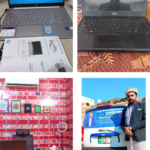Working Remotely is today’s perk
We are born into a fortunate generation. During the unfortunate period of time when people were restricted to their homes because of the worldwide pandemic, most companies started working online. All tech giants and small startups decided to allow their employees to work from home.
This was the most difficult time for some people, while some people also benefited from it. For example, if a Pakistani worked at Facebook and was earning $250K/yr in California, he was allowed to move back to Pakistan. While the cost of living decreased drastically, his salary wasn’t affected at all. This happened to almost all of the people working in the US/Europe.
I had this idea stuck in my mind that if everyone is going remote, why should I even consider a job in Pakistan? They offer insultingly low salaries as compared to US/EU market. When Pakistani companies are also allowing WFH, what will be the difference if I work at Facebook or Google, or any US/EU company? Almost all the companies on Indeed.com or Angel.co had ‘US Work Authorisation’ mandatory but soon after the pandemic, they dropped this requirement.
I thought this is the time when remote culture will BOOM in Pakistan and all the third-world countries. But soon when India & Bangladesh were far ahead in this Remote Job race, Pakistan was nowhere to be seen in these jobs. This was alarming for me.
My background
I started working online when I was in eighth grade. I initially created websites based on WordPress and soon moved to the Javascript stack. I was top-rated on Upwork and a level 1 seller on Fiverr even before when I started my BSCS degree. I completed my bachelor’s in Computer Science from FAST National University with a decent CGPA. I was always into computers and I enjoyed working on complex problems from the start. My career path was very clear, I wanted to work in a giant tech company i.e Facebook, Google, Tesla, and I used to search a lot to prepare for their interviews and programming assessments.
After my graduation, I got my first job at a reputable organization and they were offering 65K – 75K PKR to fresh graduates. The company was so well-reputed and had so many learning opportunities that I accepted the offer right away. I didn’t think about the financial aspect, my core focus was to get the best mentors and the company had the most competent mentors I could think of. The only limitation was they were completely remote and I was expecting more in-person training.
How did I find a remote job?
While the work at the Pakistani company was going very smoothly, I was mentored very sincerely, and I learned a lot of new stuff, but the financial aspect was frustrating for me. My father had just retired from a government job, inflation was at a peak, and I started to realize my family was struggling to make the ends meet. Although I got a good increment, and good bonuses, etc., it never felt right.
I started finding jobs online on Angel.co and Indeed.com. Both were bombarded with a lot of remote opportunities and every job was offering at least $40,000/yr. This accounts for around 5 Lakh PKR per month. This was an eye-opener for me. I immediately started building my resume and cover letter and spammed all the job portals.
I was rejected by almost 90% of the companies in the first phase (when the cover letter was submitted). This was because I was making multiple mistakes in the content of my cover letter. One time a company called me back to discuss why they were rejecting me, they told me that I was talking too much about myself. I wasn’t aligning myself with the company’s goals and mission. I then realized that the companies have a ‘Cultural Fit’ score for each of the candidates and that is assessed based on how well you support the mission of the company and how will you be useful. The company isn’t hiring you because you know X and Y technologies, that part is mostly present in all the applicants, the key deciding factor is your passion for the problem you want to solve.
After multiple rejections and multiple feedback, I started to improve myself. My applications started to get considered and my interviews started to get better. This made me very confident.
Soon after three months of struggle, I got my first offer letter. And just as I was about to accept it, I got another one. All these job offers were compensating with European standard salaries. They were also offering equity or stock options in their company because I resonated with their solution. I accepted an offer from a Health care startup that was literally made to save lives. This was very exciting for me.
My transition from WFH for a Pakistani company to a European company
The transition was very smooth. The time difference was 3 hours only so I worked from 12 pm to 8 pm. I had the same standups, pairing sessions, etc. as I had in the Pakistani company.
The best of all luxuries of working remotely for a European/US startup is that you get a chance to work with the big brains. Big brains in the sense that these people compete from all around the world to get the job. They are from diverse backgrounds. Someone could be from Harvard, another one could be from MIT. When all of the brains sit together to get a task done, the interaction is very fascinating.
My growth in the remote company
At least for me, the growth has been great. I’ve never felt the need for an in-person meeting or work from the office of any sort. My growth and learning haven’t been affected by the fact that I work from home and work a thousand miles apart from my colleagues.
Here are some pointers:
- Growth 1: I was shy at the start, I felt hesitant to ask questions, to ask for reviews, etc. This changed gradually. They pointed out this flaw right away.
- Growth 2: I had no composure when I used to approach a problem. I went too far or too less to figure out the solutions. They also pointed out this flaw in me and suggested remedies. They said to break down the problems into mini-problems and then asked me to write about the solutions first, then peer review those solutions. And they suggested some books which helped me a lot.
- Growth 3: I was taking too much time in reading documentation and going through code to understand everything. They suggested experimenting with anything I learn new. I created multiple mini-projects which they reviewed very thoroughly to assess my progress. This increased my learning pace up to 5x.
- Growth 4: Learning the whole stack the company used was very difficult to follow. So they forced me into pairing sessions where senior developers would just code and I was supposed to shadow them and ask questions. This increased my confidence and allowed me to code without much help later on because I knew what to do and where to find things.
- Growth 5: I told them that I want to become a software architect. They took immediate action and assigned me problems that I had no idea about. Those problems were mostly architecture related and I had to read a lot and ask for help to come up with an optimized solution. Not only that, they asked me to draw software architectures for the small problems I’m assigned to. This helped me sharpen my architecture-related skills.
- Growth 6: I had no leadership quality. So my manager added me to discussions and asked me to lead the meetings. I was the most junior member of the team. I handled the meetings and asked questions and gave presentations sometimes. This was a completely new experience for me.
Living cost
The living cost in Pakistan is way cheaper than in the US or any European country. Just for the comparison, if you see the Cost of a Living index on Numbeo, you’ll notice Pakistan’s index is at 21.53 which is below average in the score table.
This means you can enjoy a luxurious life in Pakistan by earning a standard European/US salary.
What motivates me to share this?
I want to reach where India and Bangladesh are right now. Pakistan has a major problem. We don’t encourage remote culture. We don’t train people to work remotely and we don’t go beyond 100K salary and pakki noukri. We need to change ourselves.
I’m an example for all of the Pakistanis, I graduated recently and got a remote job straight away. The remote job never became a hurdle in my growth, it rather expedited my career. I got a chance to work with the best brains in the world. I’ve been doing it for over a year and I can convince anyone to get a remote job. I think it’s the best of both worlds, you enjoy the salaries of the US/Europe and get all the luxuries while in Pakistan.
I gave an interview to Rehan Allahwala and he encouraged me to share my learnings with at least 10,000 Pakistanis. I’ve already created a group to share as much as I can. I’ll help you fix the mistakes that I made and learned the hard way.




















Discussion about this post